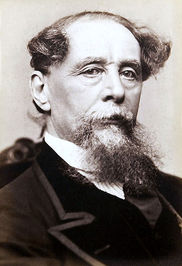
Oliver Twist
One of Dickens’s most popular novels, Oliver Twist
is the story of a young orphan who dares to say, "Please, sir, I want
some more." After escaping from the dark and dismal workhouse where he
was born, Oliver finds himself on the mean streets of
Victorian-Era London and is unwittingly recruited into a scabrous gang
of scheming urchins. In this band of petty thieves Oliver encounters the
extraordinary and vibrant characters who have captured readers’
imaginations for more than 150 years: the loathsome Fagin, the beautiful
and tragic Nancy, the crafty Artful Dodger, and perhaps one of the
greatest villains of all time—the terrifying Bill Sikes.
Rife
with Dickens’s disturbing descriptions of street life, the novel is
buoyed by the purity of the orphan Oliver. Though he is treated with
cruelty and surrounded by coarseness for most of his life, his pious
innocence leads him at last to salvation—and the shocking discovery of
his true identity.

Experience the high-spirited adventures of Oliver Twist in
this Oscar(r)-winning musical adaptation of Charles Dickens' classic
tale! Young Oliver (Mark Lester) is an orphan who escapes the cheerless
life of the workhouse and takes to the streets of 19th-Century London.
He's immediately taken in by a band of street urchins, headed by the
lovable villain, Fagin (Ron Moody), his fiendish henchman, Bill Sikes
(Oliver Reed), and his loyal apprentice, The Artful Dodger (Jack Wild).
Through his education in the fine points of pick-pocketing, Oliver makes
away with an unexpected treasure... a home and a family of his own. Set
to a heartfelt score that includes such favorites as "Consider
Yourself," "Where Is Love?" and "As Long As He Needs Me," Oliver!
leads us on a journey in search of love, belonging, and honor among
thieves. Winner of six Academy Awards(r) (1968), including Best Picture
and Best Score, Oliver! will steal your heart!
CHARLES DICKENS

Charles John Huffam Dickens
was a writer and social critic who created some of the world's
best-known fictional characters and is regarded as the greatest novelist
of the Victorian era. His works enjoyed unprecedented popularity during
his lifetime, and by the twentieth century critics and scholars had
recognized him as a literary genius. His novels and short stories enjoy
lasting popularity.
Dickens left school to work in a factory when
his father was incarcerated in a debtors' prison. Despite his lack of
formal education, he edited a weekly journal for 20 years, wrote 15
novels, five novellas, hundreds of short stories and non-fiction
articles, lectured and performed extensively, was an indefatigable
letter writer, and campaigned vigorously for children's rights,
education, and other social reforms.
Dickens was regarded as the literary colossus of his age. His 1843 novella, A Christmas Carol, remains popular and continues to inspire adaptations in every artistic genre. Oliver Twist and Great Expectations are also frequently adapted, and, like many of his novels, evoke images of early Victorian London. His 1859 novel, A Tale of Two Cities,
set in London and Paris, is his best-known work of historical fiction.
Dickens's creative genius has been praised by fellow writers—from Leo
Tolstoy to George Orwell
and G. K. Chesterton—for its realism, comedy, prose style, unique
characterisations, and social criticism. On the other hand, Oscar Wilde,
Henry James, and Virginia Woolf complained of a lack of psychological
depth, loose writing, and a vein of saccharine sentimentalism. The term
Dickensian is used to describe something that is reminiscent of Dickens
and his writings, such as poor social conditions or comically repulsive
characters.
On 8 June 1870, Dickens suffered another stroke at his home after a full day's work on Edwin Drood.
He never regained consciousness, and the next day he died at Gad's Hill
Place. Contrary to his wish to be buried at Rochester Cathedral "in an
inexpensive, unostentatious, and strictly private manner," he was laid
to rest in the Poets' Corner of Westminster Abbey. A printed epitaph
circulated at the time of the funeral reads: "To the Memory of Charles
Dickens (England's most popular author) who died at his residence,
Higham, near Rochester, Kent, 9 June 1870, aged 58 years. He was a
sympathiser with the poor, the suffering, and the oppressed; and by his
death, one of England's greatest writers is lost to the world." His last
words were: "On the ground", in response to his sister-in-law
Georgina's request that he lie down.
https://charles-dickens.org/



No comments:
Post a Comment